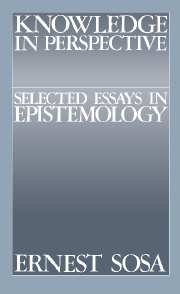Book contents
- Frontmatter
- Contents
- Sources and acknowledgments
- Introduction: back to basics
- PART I WHAT IS KNOWLEDGE, AND HOW IS IT POSSIBLE?
- 1 The analysis of “knowledge that p”
- 2 How do you know?
- 3 On our knowledge of matters of fact
- 4 Presuppositions of empirical knowledge
- PART II THEORIES OF JUSTIFICATION
- PART III INTELLECTUAL VIRTUE AND EPISTEMIC PERSPECTIVE: A VIEW PRESENTED
- PART IV INTELLECTUAL VIRTUE IN PERSPECTIVE: THE VIEW DEVELOPED
- Index
1 - The analysis of “knowledge that p”
Published online by Cambridge University Press: 08 January 2010
- Frontmatter
- Contents
- Sources and acknowledgments
- Introduction: back to basics
- PART I WHAT IS KNOWLEDGE, AND HOW IS IT POSSIBLE?
- 1 The analysis of “knowledge that p”
- 2 How do you know?
- 3 On our knowledge of matters of fact
- 4 Presuppositions of empirical knowledge
- PART II THEORIES OF JUSTIFICATION
- PART III INTELLECTUAL VIRTUE AND EPISTEMIC PERSPECTIVE: A VIEW PRESENTED
- PART IV INTELLECTUAL VIRTUE IN PERSPECTIVE: THE VIEW DEVELOPED
- Index
Summary
On Edmund Gettier's interpretation, the Ayer and Chisholm analyses of the concept of knowledge are sufficiently similar to analysis A, below, to be called the same.
Analysis A:
A person S has knowledge that p iff
(i) p is true;
(ii) S believes that p;
(iii) S is justified in believing that p.
Gettier presents us with two counter-examples to this view. I will now briefly set forth the principle of the second, which is both simpler than the first and not essentially different from it qua counter-example to A.
Suppose S has good evidence for his belief that p, from which in turn he deduces that p ∨ q. But, unknown to S, (∼p) & q. So, all three conditions for knowledge specified in the view under examination are fulfilled; but we still do not want to say that S knows that p ∨ q.
Here is a proposed analysis of the concept of knowledge, proposed as a solution to the Gettier problem:
If p is “basic,” belief that p requires no justification, subjective or objective. If p is “non-basic,” a person S has subjective justification for belief that p iff:
sj1: There is a set of statements, e1, e2, …, en, each of which S believes to be true.
[…]
- Type
- Chapter
- Information
- Knowledge in PerspectiveSelected Essays in Epistemology, pp. 15 - 18Publisher: Cambridge University PressPrint publication year: 1991



